Warren Buffett, is known as the “Oracle of Omaha,” stands as one of the most respected and successful investors in the world. His investment strategies and philosophies have not only made him a billionaire but have also influenced generations of investors. Despite his immense wealth, Buffett lives a life of simplicity, focusing on long-term investment principles and philanthropy. This article delves into Buffett’s life, his investment philosophy, his financial achievements, and the lessons investors can learn from his approach.
Biography
| Full Name | Warren Edward Buffett |
| Date of Birth | August 30, 1930 |
| Age (as of 2024) | 93 years old |
| Birthplace | Omaha, Nebraska, USA |
| Net Worth (2024) | Over $120 billion |
| Education | University of Nebraska (B.S.), Columbia Business School (M.S.) |
| Occupation | Investor, Businessman, Philanthropist |
| Known For | CEO of Berkshire Hathaway, Value Investing |
| Primary Residence | Omaha, Nebraska, USA |
| Spouse | Susan Thompson (1952-2004, deceased), Astrid Menks (married in 2006) |
| Children | Susan Alice Buffett, Howard Graham Buffett, Peter Andrew Buffett |
| Famous Quotes | “Price is what you pay; value is what you get.” |
| Notable Books | The Essays of Warren Buffett: Lessons for Corporate America |
| Favorite Car | Cadillac XTS |
| Diet | Fast food (McDonald’s) and Coca-Cola |
| Philanthropy | Co-founder of The Giving Pledge; major donor to the Gates Foundation |
| Signature Investment Style | Value Investing |
| Major Holdings | Berkshire Hathaway, Coca-Cola, Apple, American Express |
Early Life and Background
Warren was born on 30th Aug, 1930, in the city of Nebraska, Omaha. From his early life, Buffett had an aptitude for numbers and business. His father, Howard Buffett, was a stockbroker and U.S. Congressman, which exposed Warren to the world of finance early on. At 11 years age, Buffett did his first business deal, demonstrating an interest in the stock market that was a milestone for his business career.
Buffett’s early ventures into business were marked by a combination of curiosity and ambition. He delivered newspapers, sold chewing gum, and even bought pinball machines to place in local businesses. These early experiences taught him the value of money and the importance of making sound investments.
Buffett attended “The University of Pennsylvania’s Wharton School”. After that he transferred to “The University of Nebraska”, where he earned the degree of “Masters in Business Administration”. His quest for knowledge continued as he attended “Columbia Business School”. There he got a chance to study under “Benjamin Graham”, the father of value investing. Graham’s teachings would heavily influence Buffett’s investment philosophy.
Related Topics:
Jeff Bezos Net Worth and Biography 2024
Hamid Mir Net Worth and Biography 2024
Warren Buffett Net Worth
Warren Buffett’s investment acumen has made him one of the wealthiest individuals in the world. As of 2024, Buffett net worth is estimated at over $120 billion, making him one of the top five richest people globally. Despite his vast wealth, Buffett remains humble and unpretentious, living in the same Omaha home he purchased in 1958 for $31,500.
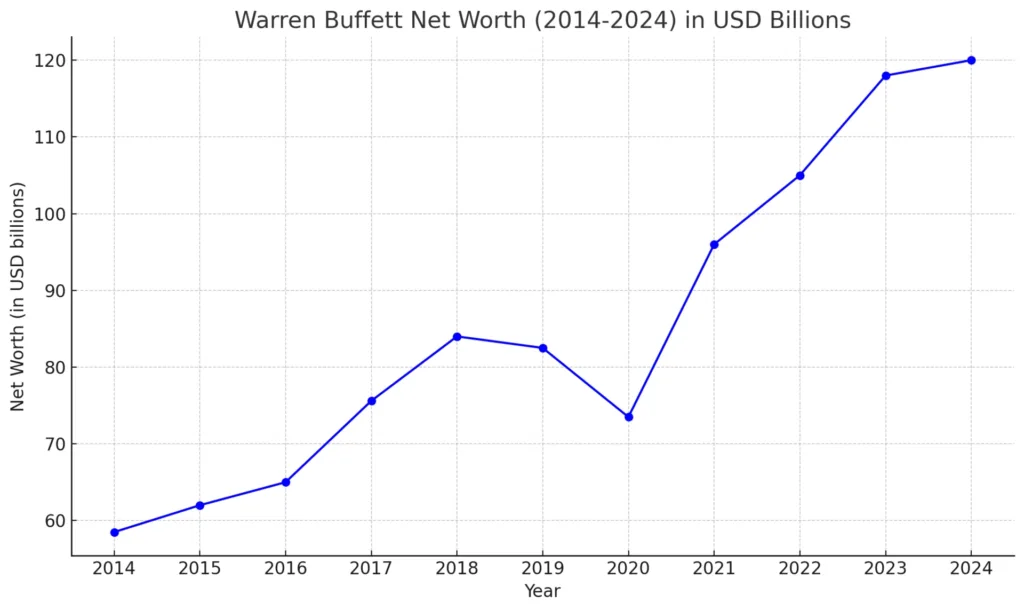
Buffett’s wealth primarily stems from his ownership of Berkshire Hathaway stock. His disciplined investment strategy and long-term perspective have allowed his wealth to grow steadily over the decades. Unlike many billionaires who focus on luxury and excess, Buffett has chosen to live a relatively modest lifestyle, reinvesting his wealth into businesses and philanthropy.
Throughout his career, Buffett has consistently ranked among the world’s wealthiest individuals. He has often used his platform to advocate for higher taxes on the rich, arguing that the ultra-wealthy should contribute more to society. Despite his enormous fortune, Buffett has pledged to give away the majority of his wealth through philanthropic efforts, particularly through The Giving Pledge, which he co-founded with Bill Gates.
Buffett’s net worth reflects not only his financial success but also his commitment to using his wealth for the greater good. His approach to wealth is guided by a sense of responsibility and a desire to make a positive impact on the world.
Buffett Net Worth in Rupees
As of 2024, Warren Buffett net worth in Indian Rupees is approximately ₹9,80,000 crores. This staggering figure highlights his status as among the most successful investors globally, with a significant impact on the financial markets.
Buffett Net Worth 2014-2024
| Year | Net Worth (in USD billions) | Net Worth (in INR crores) |
| 2014 | 58.5 | 4,80,000 |
| 2015 | 62.0 | 5,09,000 |
| 2016 | 65.0 | 5,32,000 |
| 2017 | 75.6 | 6,20,000 |
| 2018 | 84.0 | 6,87,000 |
| 2019 | 82.5 | 6,74,000 |
| 2020 | 73.5 | 6,00,000 |
| 2021 | 96.0 | 7,80,000 |
| 2022 | 105.0 | 8,55,000 |
| 2023 | 118.0 | 9,61,000 |
| 2024 | 120.0 | 9,80,000 |
Buffett Income Per Day in USD
Warren Buffett per day income is approximately $30 million or more, depending on market conditions and the performance of his investments. This figure reflects the combined effects of capital appreciation and dividend income from his substantial holdings.
Buffet Income Per Day in Rupees
Warren Buffett’s estimated per day income in Indian Rupees is approximately ₹246 crore or ₹2,460 million. This figure is an approximation and can vary with fluctuations in both his income and the exchange rate.
Warren Buffett Age
Warren Buffett was born on August 30, 1930, which makes him 93 years old in 2024. Despite his advanced age, Buffett remains actively involved in his investment empire, continuously shaping the global financial landscape.
Warren Buffett House

Warren Buffett lives in a modest home in Omaha, Nebraska, which he bought in the year of 1958 for just $31,500. Despite his immense wealth, Buffett has chosen to stay in this house, valuing simplicity and frugality over luxury.
Warren Buffett Wife
Warren Buffett married to “Susan Thompson” in 1952. Later she passed in 2004. In 2006, he married to Astrid Menks, a close family friend for many years. Both women played significant roles in Buffett’s life, offering him personal and emotional support.
Warren Buffett Education
Warren Buffett’s education began at the University of Pennsylvania’s Wharton School, where he studied for two years before transferring to the University of Nebraska. He later earned a Master’s degree in Economics from Columbia Business School, where he studied under Benjamin Graham, the father of value investing.
Warren Buffett Children
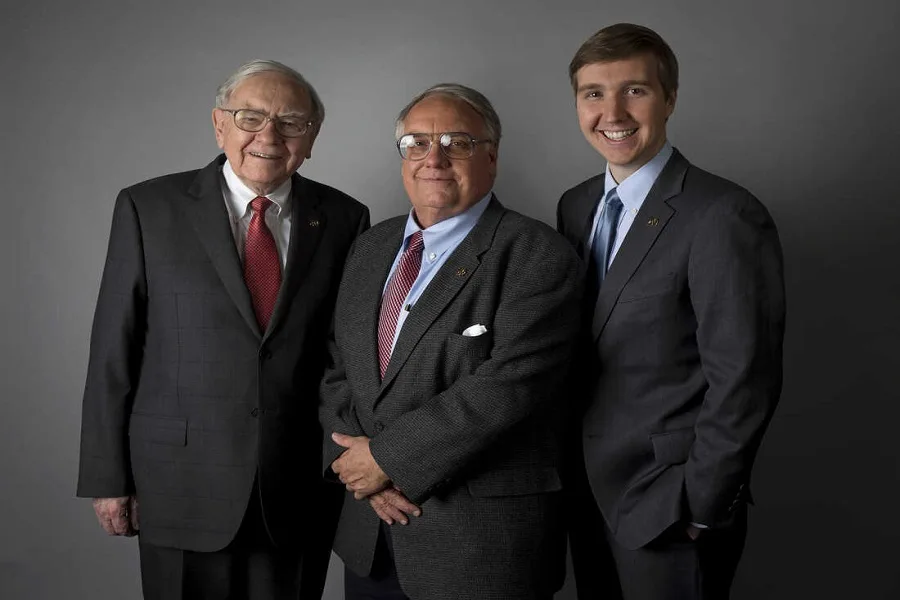
Warren Buffett has three children: Susan Alice Buffett, Howard Graham Buffett, and Peter Andrew Buffett. All three have pursued philanthropic efforts, inspired by their father’s example of using wealth to benefit society.
Warren Buffett At His Young Age
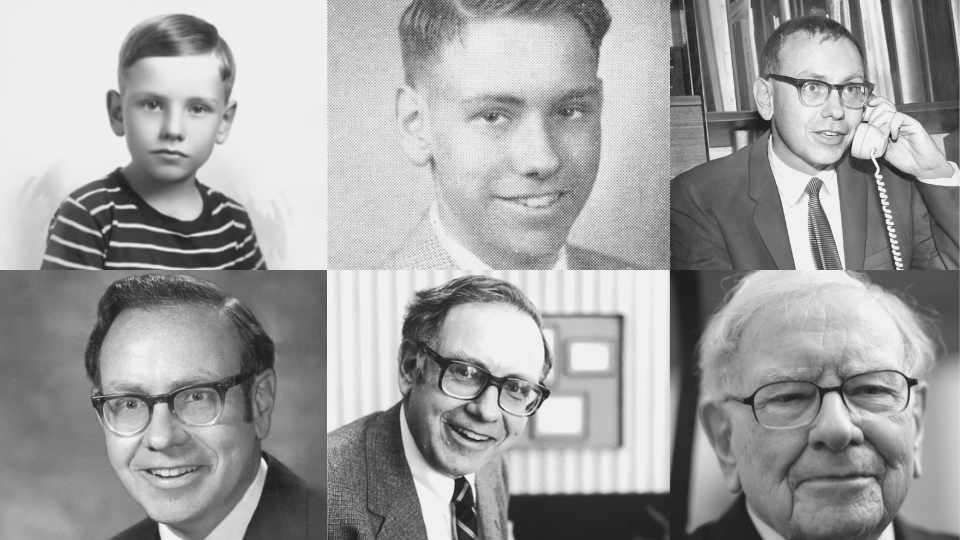
As a young man, Warren Buffett displayed an early interest in business and investing. By the age of 11, he had purchased his first stock. His entrepreneurial spirit continued through his teenage years, as he ran multiple small businesses, including a pinball machine operation.
Warren Buffett Car
Here is a list of cars that Warren Buffett has owned or driven over the years:
1. Cadillac DTS -Year: 2006

Details: Warren Buffett famously drove a Cadillac DTS for several years. Known for his frugality, Buffett held onto this car for a long time before deciding to upgrade.
2. Cadillac XTS -Year: 2014

Details: In 2014, Buffett upgraded to a Cadillac XTS. The decision to buy this car came after his daughter convinced him that it was time for a newer vehicle. General Motors, the manufacturer of Cadillac, is a company in which Buffett has significant investments, aligning with his philosophy of using products from companies he invests in.
3. Lincoln Town Car -Year: 2001

Details: Before the Cadillac DTS, Buffett was known to drive a 2001 Lincoln Town Car. The car was auctioned off for charity in 2006, raising $73,200 for Girls Inc., a nonprofit organization.
4. Volkswagen Beetle -Year: 1957

Details: Early in his life, Warren Buffett drove a 1957 Volkswagen Beetle. This car symbolizes his frugal nature, as he preferred practical and economical vehicles even as he started amassing wealth.
5. Ford F-150 -Year: 1990s

Details: Although not widely reported, Buffett is believed to have owned or driven a Ford F-150, particularly in the 1990s. This vehicle choice aligns with his reputation for choosing reliable and American-made vehicles.
Warren Buffett Diet
Warren Buffett’s diet is famously unconventional. He is known for his love of Coca-Cola, consuming several cans a day, and for indulging in fast food like McDonald’s. Buffett has often joked that his diet aligns more with that of a six-year-old than a billionaire.
Investment Philosophy
Warren Buffett’s investment philosophy revolves around the principles of value investing, a strategy that focuses on buying undervalued stocks with strong fundamentals. Buffett seeks companies with durable competitive advantages, strong management teams, and consistent earnings. He believes in holding investments for the long term, allowing the power of compound interest to work in his favor.
Buffett’s approach to investing is simple yet profound: buy quality businesses at reasonable prices and hold them for the long haul. He famously stated, “Our favorite holding period is forever.” This long-term perspective contrasts with the short-term focus of many modern investors who chase quick profits. Buffett’s strategy emphasizes patience, discipline, and thorough research.
Buffett also places a strong emphasis on the intrinsic value of a company. He calculates this by analyzing the company’s financial statements, management team, and market position. Buffett invests only when he believes the market has undervalued a company’s intrinsic worth. This conservative approach minimizes risk and maximizes potential returns.
Buffett’s investment philosophy extends beyond the stock market. He advises individuals to invest in themselves by continuously learning and improving their skills. He often says, “The best investment you can make is in yourself.” This belief in self-improvement has guided Buffett throughout his life, as he remains an avid reader and lifelong learner.
Success with Berkshire Hathaway

Warren Buffett’s success is most prominently displayed through his leadership of Berkshire Hathaway, a multinational conglomerate holding company. In 1962, Buffett began buying shares of Berkshire Hathaway, a struggling textile company. By 1965, he had taken control of the company and began transforming it into one of the largest and most successful conglomerates in the world.
Buffett’s strategy for Berkshire Hathaway involved acquiring and holding a diverse range of businesses. He focused on companies with strong brands, consistent earnings, and competent management. Some of Berkshire Hathaway’s most notable acquisitions include GEICO, BNSF Railway, and Dairy Queen. Additionally, Buffett’s investments in publicly traded companies like Coca-Cola, American Express, and Apple have generated substantial returns for Berkshire Hathaway.
Under Buffett’s leadership, Berkshire Hathaway’s stock price has grown exponentially. When he took control of the company in 1965, its stock traded at around $19 per share. As of 2024, Berkshire Hathaway’s Class A shares are valued at over $500,000 each, making it one of the most expensive stocks in the world.
Buffett’s ability to identify and invest in undervalued businesses has earned him a reputation as one of the greatest investors of all time. His success with Berkshire Hathaway serves as a testament to the effectiveness of his investment philosophy.
Personal Traits and Habits
Warren Buffett’s personal traits and habits have contributed significantly to his success as an investor and businessman. One of Buffett’s most notable characteristics is his simplicity. Despite being a billionaire, Buffett lives a life of frugality and modesty. He drives a simple car, lives in the same house he bought decades ago, and enjoys regular meals at local diners.
Buffett’s daily routine is centered around continuous learning. He spends a significant portion of his day reading books, newspapers, and financial reports. This habit of constant learning allows Buffett to stay informed and make well-researched investment decisions. He believes that knowledge compounds over time, much like money, and that staying informed is crucial for long-term success.
Buffett also values relationships and surrounding himself with like-minded individuals. He has maintained a close friendship with fellow billionaire Bill Gates for many years. Buffett credits much of his success to the people he has worked with, including his long-time business partner, Charlie Munger. Together, Buffett and Munger have steered Berkshire Hathaway to unparalleled success.
Philanthropy plays a central role in Buffett’s life. In 2006, he announced his intention to give away the majority of his fortune to charitable causes. He has already donated billions to the Bill & Melinda Gates Foundation and other charitable organizations. Buffett’s commitment to giving back is rooted in his belief that those who benefit from society’s opportunities have a responsibility to contribute to its improvement.
Buffett’s personal habits of simplicity, continuous learning, and philanthropy have not only shaped his success but also inspired countless others to pursue similar values.
Warren Buffett Books
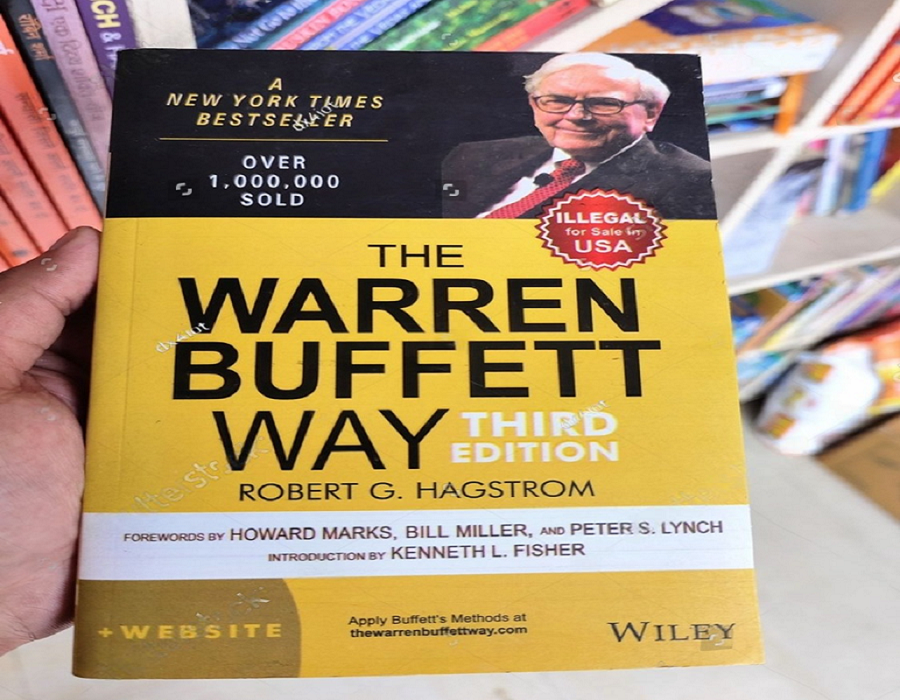
Here is a list of books related to Warren Buffett, including books written by him and about him:
Books Written by Warren Buffett (or Based on His Writings):
- The Essays of Warren Buffett: Lessons for Corporate America
- Edited by Lawrence A. Cunningham, this book compiles Warren Buffett’s annual letters to Berkshire Hathaway shareholders, offering deep insights into his investment philosophy and business strategies.
- Warren Buffett’s Ground Rules: Words of Wisdom from the Partnership Letters of the World’s Greatest Investor
- Written by Jeremy Miller, this book distills the key principles from Buffett’s partnership letters before he took control of Berkshire Hathaway.
Books About Warren Buffett:
- The Snowball: Warren Buffett and the Business of Life
- Authored by Alice Schroeder, this is an authorized biography of Warren Buffett, providing an in-depth look at his life, career, and the principles that guided him.
- Buffett: The Making of an American Capitalist
- Written by Roger Lowenstein, this biography covers Warren Buffett’s rise to success and the development of his investment philosophy.
- Warren Buffett and the Interpretation of Financial Statements
- Co-authored by Mary Buffett (Warren Buffett’s former daughter-in-law) and David Clark, this book explains how Warren Buffett analyzes financial statements to identify great investment opportunities.
- The Warren Buffett Way
- Authored by Robert G. Hagstrom, this book provides a detailed analysis of Buffett’s investment strategies and the principles that have made him successful.
- Tap Dancing to Work: Warren Buffett on Practically Everything, 1966-2013
- Edited by Carol J. Loomis, this book is a collection of articles and essays written by Warren Buffett and about him, providing insights into his thoughts and approach to investing and business.
- Of Permanent Value: The Story of Warren Buffett
- Written by Andrew Kilpatrick, this book is a comprehensive biography that delves into Buffett’s life, his business practices, and his impact on the investment world.
- The Warren Buffett Portfolio: Mastering the Power of the Focus Investment Strategy
- Another book by Robert G. Hagstrom, this one focuses on Buffett’s unique investment strategy, which involves concentrating investments in a few select companies.
Books Inspired by Warren Buffett’s Philosophy:
- The Intelligent Investor
- Written by Benjamin Graham, Warren Buffett’s mentor, this book is often recommended by Buffett himself as one of the best books on investing. It lays the foundation for the value investing philosophy that Buffett follows.
These books provide a comprehensive understanding of Warren Buffett’s life, investment philosophy, and business strategies, making them essential reading for anyone interested in his approach to investing and leadership.
Lessons from Warren Buffett
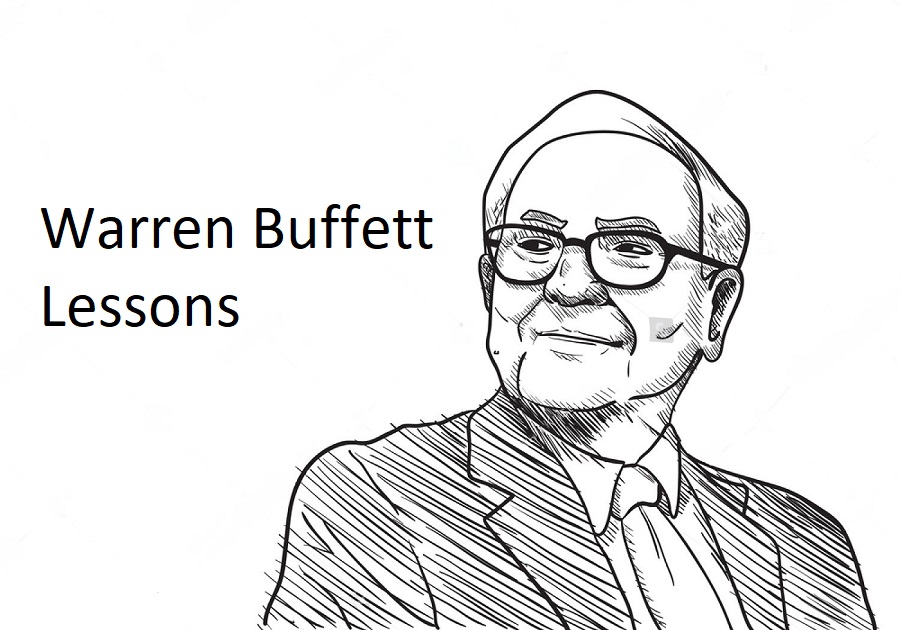
Warren Buffett’s life and career offer numerous lessons for investors and individuals alike. His approach to investing, wealth, and life provides timeless wisdom that can be applied in various aspects of personal and professional development.
1. Patience Pays Off: One of the most important lessons from Buffett is the value of patience. He advocates for holding investments for the long term and allowing compound interest to work its magic. Buffett’s philosophy of “buy and hold” contrasts with the fast-paced, short-term trading strategies that dominate today’s market. By being patient and disciplined, investors can achieve significant returns over time.
2. Invest in What You Understand: Buffett famously advises investors to “never invest in a business you cannot understand.” He emphasizes the importance of thoroughly researching and understanding the companies in which you invest. This approach reduces risk and increases the likelihood of making informed decisions. Buffett’s success with companies like Coca-Cola and Apple stems from his deep understanding of their business models and market positions.
3. Focus on Quality: Buffett’s investment strategy centers around buying high-quality companies with strong fundamentals. He looks for businesses with durable competitive advantages, competent management, and consistent earnings. This focus on quality ensures that his investments are resilient in the face of market fluctuations. For individual investors, this means prioritizing quality over quantity and avoiding the temptation to chase high-risk, high-reward opportunities.
4. Stay Humble: Despite his immense wealth and success, Buffett remains humble and grounded. He lives a simple life, values relationships, and is always willing to admit his mistakes. This humility has allowed him to learn from his experiences and continuously improve as an investor. Buffett’s humility serves as a reminder that success should not change one’s values or character.
5. Give Back: Buffett’s commitment to philanthropy underscores the importance of giving back to society. He believes that those who have been fortunate should use their resources to help others. His participation in The Giving Pledge and his significant charitable donations reflect his belief in the power of philanthropy. For individuals, this means recognizing the value of contributing to causes that make a positive impact on the world.
6. Continuous Learning: Buffett’s dedication to continuous learning has been a cornerstone of his success. He spends hours each day reading and expanding his knowledge. This habit allows him to stay informed and make well-researched decisions. For individuals, the lesson is clear: never stop learning. Whether through books, courses, or experiences, continuous learning is essential for personal and professional growth.
7. Long-Term Thinking: Buffett’s long-term perspective has been key to his investment success. He advises against getting caught up in short-term market movements and instead focuses on the long-term potential of his investments.
This mindset applies not only to investing but also to life in general. Thinking long-term helps individuals make decisions that are aligned with their goals and values.
Warren Buffett Quotes
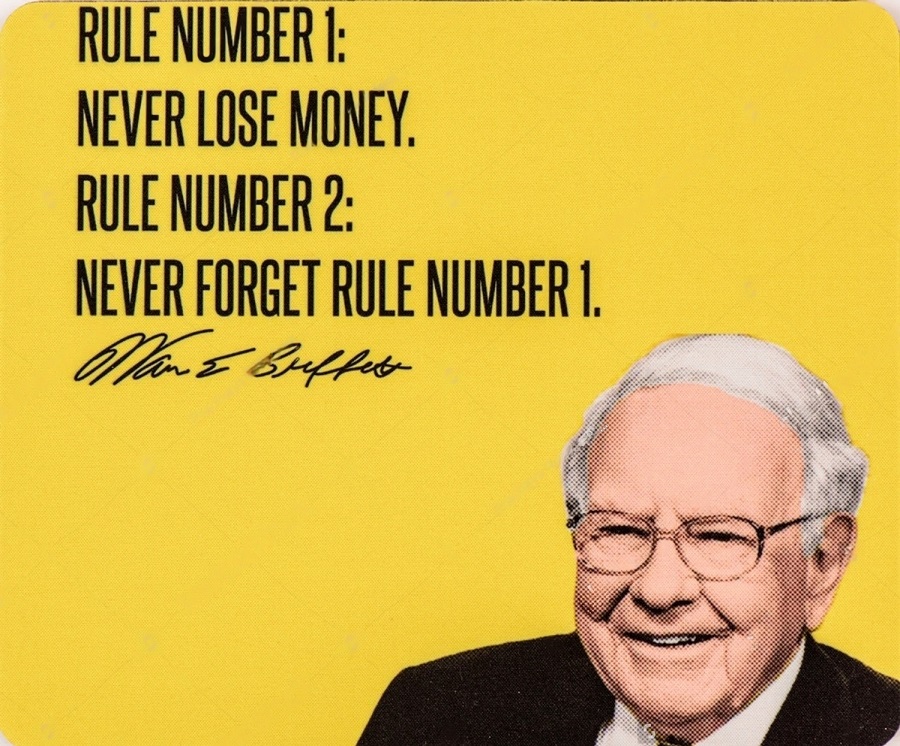
Warren Buffett is known for his pithy and insightful quotes. Some of his most famous include,
On Investing:
- “Price is what you pay; value is what you get.” —Warren Buffett
- This quote emphasizes the importance of understanding the true value of an investment, rather than just focusing on its price.
- “Rule No. 1: Never lose money. Rule No. 2: Never forget Rule No. 1.”—Warren Buffett
- Buffett stresses the importance of preserving capital and avoiding losses, a key principle in his investment strategy.
- “It’s far better to buy a wonderful company at a fair price than a fair company at a wonderful price.” —Warren Buffett
- This quote highlights Buffett’s preference for investing in high-quality companies, even if they come at a higher price.
- “Our favorite holding period is forever.” —Warren Buffett
- Buffett advocates for long-term investing, believing that patience is essential for maximizing returns.
- “Be fearful when others are greedy and greedy when others are fearful.” —Warren Buffett
- This quote captures Buffett’s contrarian investment philosophy, advising investors to go against the crowd during market extremes.
On Business:
- “The business schools reward difficult complex behavior more than simple behavior, but simple behavior is more effective.” —Warren Buffett
- Buffett criticizes the tendency to overcomplicate business strategies, advocating instead for straightforward and effective approaches.
- “In the business world, the rearview mirror is always clearer than the windshield.” —Warren Buffett
- This quote reflects the idea that it’s easier to understand and analyze past events than to predict the future.
- “You only have to do a very few things right in your life so long as you don’t do too many things wrong.” —Warren Buffett
- Buffett suggests that success comes from focusing on a few key areas and avoiding major mistakes.
On Life and Success:
- “It takes 20 years to build a reputation and five minutes to ruin it. If you think about that, you’ll do things differently.” —Warren Buffett
- Buffett underscores the importance of integrity and the long-term impact of one’s actions on their reputation.
- “The best investment you can make is in yourself.” —Warren Buffett
- This quote highlights Buffett’s belief in continuous self-improvement and education as the most valuable investments one can make.
- “Someone’s sitting in the shade today because someone planted a tree a long time ago.” —Warren Buffett
- Buffett speaks to the importance of long-term planning and the benefits that can come from early and thoughtful action.
- “You don’t need to be a rocket scientist. Investing is not a game where the guy with the 160 IQ beats the guy with the 130 IQ.” —Warren Buffett
- Buffett believes that investing success is more about temperament and discipline than intelligence.
On Wealth and Giving:
- “The most important investment you can make is in yourself.” —Warren Buffett
- Buffett emphasizes the importance of personal growth and learning in achieving success.
- “If you’re in the luckiest 1% of humanity, you owe it to the rest of humanity to think about the other 99%.” —Warren Buffett
- This quote reflects Buffett’s commitment to philanthropy and his belief in giving back to society.
- “The rich invest in time, the poor invest in money.” —Warren Buffett
- Buffett contrasts the long-term thinking of the wealthy with the short-term focus often seen among those with fewer resources.
FAQ
Here are some frequently asked questions by the people related to Buffett.
What is Warren Buffett Famous For?
Warren Buffett is famous for his extraordinary success as an investor and for his leadership of Berkshire Hathaway. He is known for his value investing strategy, his frugal lifestyle, and his commitment to philanthropy through initiatives like The Giving Pledge.
How Did Warren Buffett Get Rich?
Warren Buffett became rich by investing in undervalued companies and holding them for the long term. His strategy of buying high-quality businesses at reasonable prices, along with his ability to foresee market trends, enabled him to accumulate vast wealth over decades.
What Does Warren Buffett Own the Most Of?
Warren Buffett owns the most significant portion of his wealth in Berkshire Hathaway stock. Through Berkshire, he also owns substantial stakes in companies like Coca-Cola, Apple, American Express, and Bank of America, making him a key player in various industries.
Who Did Warren Buffett Leave His Money To?
Warren Buffett has pledged to leave the majority of his fortune to philanthropy. Through The Giving Pledge, he has committed to donating at least 99% of his wealth, primarily to the Bill & Melinda Gates Foundation and his children’s charitable foundations.
Why Is Warren Buffett So Successful?
Warren Buffett’s success stems from his disciplined investment approach, long-term perspective, and deep understanding of business fundamentals. His ability to remain patient and rational in volatile markets, along with his focus on investing in high-quality companies, has led to consistent success.
What Are Warren Buffett’s 5 Rules of Investing?
Warren Buffett’s five rules of investing include:
1. Invest in what you know.
2. Focus on quality businesses with strong management.
3. Buy at a fair price and hold for the long term.
4. Avoid unnecessary risks and speculation.
5. Be patient and let your investments compound over time.
How Powerful Is Warren Buffett?
Warren Buffett is incredibly powerful, both as an investor and as a philanthropist. His decisions can move markets, and his opinions are highly respected in the financial community. Moreover, his philanthropic efforts have influenced many other billionaires to commit to giving away large portions of their wealth.
Conclusion
Warren Buffett’s life and career provide a blueprint for success in both investing and personal development. His investment philosophy, rooted in value investing and long-term thinking, has made him one of the wealthiest individuals in the world. Despite his immense wealth, Buffett remains humble, lives simply, and is committed to giving back to society.
The lessons from Buffett’s life are timeless and applicable to anyone looking to achieve success in their own endeavors. Patience, humility, continuous learning, and a focus on quality are just a few of the principles that have guided Buffett’s extraordinary career.
As we look to the future, Warren Buffett’s wisdom will continue to influence investors and individuals alike. By following his example, we can all strive to make better decisions, achieve our goals, and contribute positively to the world.






This is thhe right website for anyone who woulld like to find out about this topic.
You realize a whole lot its almost tough to argue wioth you (not
that I actually would want to…HaHa). You certainly put a fresh spin on a
subject that has been discussed for years. Wonderful stuff, just great!